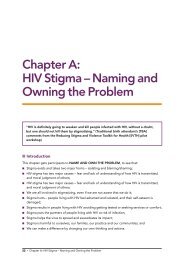Implementing Multiple Gender Strategies to Improve HIV and ... - ICRW
Implementing Multiple Gender Strategies to Improve HIV and ... - ICRW
Implementing Multiple Gender Strategies to Improve HIV and ... - ICRW
You also want an ePaper? Increase the reach of your titles
YUMPU automatically turns print PDFs into web optimized ePapers that Google loves.
Sessions center around small group activities. Groups are determined by<br />
two criteria. The first is age, with groupings of 7- <strong>to</strong> 10-year-olds, 11- <strong>to</strong> 14-<br />
year-olds, <strong>and</strong> 15- <strong>to</strong> 24-year-olds. The communication messages are<br />
adapted according <strong>to</strong> age <strong>and</strong> sexual habits of the age group. The second<br />
criterion is by sex, with groups of only girls, only boys, or a mix of the two.<br />
The division between sexes allows the children <strong>to</strong> speak without inhibition.<br />
Members of the Epouses des Militaires de Côte d'Ivoire (AEMCI), a military<br />
wives association, are trained <strong>to</strong> conduct sessions with parents, particularly<br />
mothers, on how <strong>to</strong> discuss sexual <strong>and</strong> reproductive health issues with their<br />
children.<br />
Peer educa<strong>to</strong>rs use information, education, <strong>and</strong> communication (IEC)<br />
materials <strong>and</strong> educational kits <strong>to</strong> cover issues such as mutual fidelity <strong>and</strong><br />
other means of prevention such as correct <strong>and</strong> consistent condom use.<br />
Discussions around the fight against stigma <strong>and</strong> discrimination also occur.<br />
<strong>HIV</strong> mobile <strong>and</strong> fixed counseling <strong>and</strong> testing sites deliver services based on<br />
national norms. Clients are also referred <strong>to</strong> health centers, local<br />
associations, <strong>and</strong> nongovernmental organizations for palliative care<br />
services. Peer educa<strong>to</strong>rs help ensure that uniformed service personnel <strong>and</strong><br />
their families are aware of <strong>and</strong> use available services.<br />
<strong>Gender</strong>-related activities were planned for <strong>and</strong> included at the beginning of<br />
the program. OHP addresses gender equity by working with AEMCI <strong>to</strong><br />
improve women’s abilities <strong>to</strong> negotiate condom use, <strong>to</strong> advocate for<br />
orphans <strong>and</strong> vulnerable children, <strong>and</strong> <strong>to</strong> advocate for the rights of women<br />
who test positive <strong>and</strong> are rejected by their spouses. In small-group peer<br />
education sessions, the program also seeks <strong>to</strong> improve knowledge of the<br />
link between <strong>HIV</strong> transmission <strong>and</strong> high-risk behaviors, such as genderbased<br />
violence. OHP also uses sessions <strong>to</strong> target male norms, such as<br />
the perception that infidelity among males is a proof of virility, as well as<br />
improve awareness of harmful masculine behaviors, such as crossgenerational<br />
sex, transactional sex, multiple concurrent partnerships, <strong>and</strong><br />
substance abuse.<br />
Target Audience<br />
Uniformed personnel, their partners, <strong>and</strong> their children<br />
Level of Intervention • Individual<br />
• Family<br />
• Community<br />
• District<br />
• National<br />
Geographic<br />
Location<br />
Nationwide<br />
Timeframe Oc<strong>to</strong>ber 2005–September 2009<br />
Funders • The U.S. President’s Emergency Plan for AIDS Relief (PEPFAR)<br />
through the United States Centers for Disease Control <strong>and</strong> Prevention<br />
(CDC)<br />
24
















